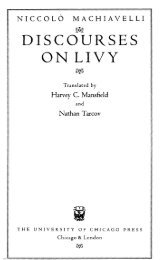THE REPUBLIC OF PLATO - Studyplace
THE REPUBLIC OF PLATO - Studyplace
THE REPUBLIC OF PLATO - Studyplace
Create successful ePaper yourself
Turn your PDF publications into a flip-book with our unique Google optimized e-Paper software.
II. 365J JUSTICE VALUED FOR ITS RESULTS 51<br />
of our neighbours without being punished. You might object that<br />
the gods are not to be deceived and are beyond the reach of violence.<br />
But suppose that there are no gods, or that they do not concern<br />
themselves with the doings of men; why should we concern<br />
ourselves to deceive them Or, if the gods do exist and care for<br />
mankind, all we know or have ever heard about them comes from<br />
current tradition and from the poets who recount their family history,<br />
and these same authorities also assure us that they can be<br />
won over and turned from their purpose 'by sacrifice and humble<br />
prayers' and votive offerings. We must either accept both these<br />
statements or neither. If we are to accept both, we had better do<br />
wrong and use part of the proceeds to offer sacrifice. By being just<br />
we may escape the punishment of heaven, but we shall be renouncing<br />
the profits of injustice; whereas by doing wrong we<br />
shall make our profit and escape punishment into the bargain, by<br />
means of those entreaties which win over the gods when we transgress<br />
and do amiss. But then, you will say, in the other world the<br />
penalty for our misdeeds on earth will fall either upon us or upon<br />
our children's children. We can counter that objection by reckoning<br />
on the great efficacy of mystic rites and the divinities of absolution,<br />
vouched for by the most advanced societies and by the descendants<br />
of the gods who have appeared as poets and spokesmen<br />
Qf heavenly inspiration.<br />
What reason, then, remains for preferring justice to the extreme<br />
of injustice, when common belief and the best authorities promise<br />
us the fulfilment of our desires in this life and the next, if only we<br />
conceal our ill-doing under a veneer of decent behaviour The upshot<br />
is, Socrates, that no man possessed of superior powers of mind<br />
or person or rank or wealth will set any value on justice; he is<br />
more likely to laugh when he hears it praised. So, even one who<br />
could prove my case false and were quite sure that justice is best,<br />
far from being indignant with the unjust, will be very ready to<br />
excuse them. He will know that, here and there, a man may refrain<br />
from wrong because it revolts some instinct he is graced with<br />
or because he has come to know the truth; no one else is virtuous<br />
of his own will; it is only lack of spirit or the infirmity of age or<br />
some other weakness that makes men condemn the iniquities they









